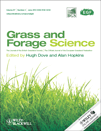
GRASS AND FORAGE SCIENCE
Scope & Guideline
Transforming Agricultural Practices with Cutting-Edge Research
Introduction
Aims and Scopes
- Forage Crop Management and Improvement:
Research centered on the agronomic practices, breeding, and genetic improvement of forage crops aimed at enhancing yield, quality, and resilience of grasslands. - Ecosystem Services and Sustainability:
Exploration of how grasslands contribute to ecosystem services, including carbon sequestration, biodiversity conservation, and soil health, emphasizing sustainable management practices. - Animal Nutrition and Performance:
Studies investigating the nutritional value of various forage species and their impact on livestock performance, health, and productivity. - Soil and Water Interaction:
Research on the interactions between forage systems and soil health, including nutrient cycling, soil organic matter dynamics, and water use efficiency. - Technological Innovations in Forage Management:
Application of advanced technologies, such as remote sensing, machine learning, and biorefining processes, to improve the management and utilization of forage resources.
Trending and Emerging
- Precision Agriculture and Technology Integration:
An increasing number of studies leverage technologies such as UAVs, hyperspectral imaging, and machine learning to enhance forage biomass predictions and optimize management practices. - Intercropping and Multi-Species Systems:
There is a notable trend towards research on intercropping and the benefits of multi-species forage systems, which promote biodiversity and improve resilience against pests and diseases. - Climate Resilience and Adaptation Strategies:
Research on the adaptation of forage systems to climate change impacts, including drought tolerance and soil health management, is gaining prominence as agricultural systems face new environmental challenges. - Nutrient Management and Soil Health:
A growing emphasis on the relationship between nutrient management practices and soil health, exploring organic amendments and sustainable fertilization techniques to enhance both forage quality and environmental sustainability. - Ecosystem Services from Grasslands:
Emerging research focuses on quantifying and enhancing ecosystem services provided by grasslands, such as carbon sequestration, water filtration, and habitat provision, aligning with global sustainability goals.
Declining or Waning
- Traditional Monoculture Practices:
Research on traditional grass monocultures is declining as there is a growing emphasis on diverse, multi-species pastures that enhance ecosystem resilience and productivity. - Basic Forage Quality Assessment:
Studies focusing solely on basic quality parameters of forages are diminishing as research increasingly integrates complex interactions involving soil health, animal nutrition, and environmental impacts. - Historical Practices in Grassland Management:
There is a decrease in papers examining historical grassland management practices, as the focus shifts towards innovative and sustainable management strategies that address contemporary agricultural challenges.
Similar Journals

Agronomy-Basel
Cultivating Knowledge for Sustainable AgricultureAgronomy-Basel is a leading international journal dedicated to advancing the field of agronomy and crop science, published by the respected MDPI. Since its inception in 2011, this open-access journal has provided a vital platform for the dissemination of high-quality research, featuring innovative studies and reviews that contribute to the understanding of agricultural practices and crop management. With an impressive impact factor and ranked in the Q1 quartile of its category for 2023, Agronomy-Basel has established itself as a premier resource in the realm of Agricultural and Biological Sciences, achieving a commendable rank of #62 out of 406 in its field, placing it in the 84th percentile. The journal targets researchers, professionals, and students who are dedicated to enhancing agricultural sustainability and productivity. Located in Basel, Switzerland, the journal's commitment to open access empowers global accessibility to flourishing agricultural advancements, thus fostering collaboration and innovation across the globe.
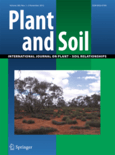
PLANT AND SOIL
Innovating research to enhance crop productivity and ecosystem balance.PLANT AND SOIL is a prestigious academic journal that has been at the forefront of plant and soil research since its inception in 1948. Published by SPRINGER in the Netherlands, this journal has carved a niche as a leading source of high-quality, peer-reviewed articles, which are essential for researchers, professionals, and students in the fields of Plant Science and Soil Science. With an impressive impact factor placing it in the Q1 category of both disciplines, it ranks 50th in the field of Plant Science and 24th in Soil Science, highlighting its influence in the scientific community. Although not available as open access, the journal provides a wealth of knowledge and insights into the interactions between plants and soils, exploring critical topics such as soil health, crop productivity, and sustainable agriculture practices. Researchers who wish to contribute to this vital area of study through their empirical findings will find PLANT AND SOIL to be an invaluable platform for disseminating their work and connecting with a network of leading scholars committed to advancing our understanding of these essential ecosystems.

Acta Scientiarum Polonorum-Formatio Circumiectus
Advancing ecological insights for a sustainable future.Acta Scientiarum Polonorum-Formatio Circumiectus is a distinguished open-access journal published by WYDAWNICTWO UNIWERSYTETU ROLNICZEGO HUGONA KOLLATAJA KRAKOWIE, dedicated to advancing knowledge in the fields of ecological modeling, environmental engineering, nature and landscape conservation, and water science and technology. With a commitment to accessibility since its inception in 2006, this journal provides a platform for researchers, professionals, and educators to disseminate their findings to a global audience. Although currently categorized in the Q4 quartile across various ecological disciplines, the journal's aim is to foster critical discussions and innovative approaches to pressing environmental challenges. The journal is based in Poland, and its scope encompasses a wide array of research areas pertinent to contemporary environmental studies. Acta Scientiarum Polonorum serves as an essential resource in its field, encouraging empirical research and theoretical advancements that collectively contribute to sustainable development and environmental stewardship.

REVISTA BRASILEIRA DE CIENCIA DO SOLO
Advancing Soil Science for a Sustainable FutureREVISTA BRASILEIRA DE CIENCIA DO SOLO, published by the SOC BRASILEIRA DE CIENCIA DO SOLO, serves as a vital open-access platform for disseminating impactful research in the fields of Agronomy and Soil Science. With an ISSN of 0100-0683 and an E-ISSN of 1806-9657, this journal has been fostering academic dialogue since 2003 and has gained recognition as a Q2 journal in both Agronomy and Soil Science as of 2023. Based in Brazil and actively supporting scientists and practitioners globally, it is uniquely positioned to address the challenges and innovations in soil management and cultivation practices. The journal's Scopus rankings reflect its commitment to quality, standing at #164/406 in Agronomy and Crop Science and #74/159 in Soil Science, placing it in the top quartile of its category. Researchers, professionals, and students are encouraged to contribute their findings and insights, making it a significant resource for anyone interested in advancing the science of soil and crop stewardship.

Revista Ciencia Agronomica
Exploring the frontiers of agricultural science.Revista Ciencia Agronomica is a leading open access journal published by the Universidade Federal do Ceará, Departamento de Geociências, dedicated to advancing the field of agricultural sciences. Established in 2008, the journal has emerged as a significant platform for the dissemination of original research and innovative advancements in areas including agronomy, horticulture, and soil science, with a dedicated convergence of years extending to 2025. With an impactful presence in academic circles—ranking in Q3 for Agronomy and Crop Science and Soil Science and Q2 for Horticulture in 2023—this journal provides vital insights for researchers and practitioners alike. Although specific HIndex metrics are currently unavailable, the journal's Scopus rankings attest to its relevance, placing it in the 52nd, 44th, and 43rd percentiles across multiple pertinent categories. Since transitioning to an open access model in 2010, Revista Ciencia Agronomica has committed to maximizing the reach and impact of its published work, thereby ensuring valuable contributions to global agricultural knowledge.
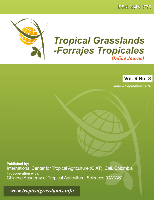
Tropical Grasslands-Forrajes Tropicales
Exploring innovations in agronomy and ecology.Tropical Grasslands-Forrajes Tropicales is a distinguished open-access journal dedicated to advancing the field of agronomy, ecology, and plant science, published by the renowned CENTER INT AGRICULTURA TROPICAL-CIAT in Colombia. Since its inception in 2013, the journal has fostered significant contributions to the understanding of tropical grassland ecosystems and forage technologies, making it an essential resource for researchers, practitioners, and students alike. With an ISSN of 2346-3775 and a commitment to promoting scholarly communication, it operates under the principles of open access, ensuring that high-quality research is accessible to a global audience. The journal currently holds a commendable position within the Q3 quartile categories for Agronomy and Crop Science, Ecology, Evolution, Behavior and Systematics, and Plant Science, indicating its relevance and impact in the respective fields. As of 2023, it ranks in the 37th percentile for Agronomy, 34th in Plant Science, and 32nd in Ecology, showcasing its growing influence and contribution to tropical agricultural science. By providing a platform for innovative research and insightful discussions, Tropical Grasslands-Forrajes Tropicales plays a pivotal role in addressing the challenges and opportunities in tropical grassland management and forage production.
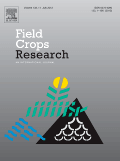
FIELD CROPS RESEARCH
Driving Change in Agronomy with Peer-Reviewed ExcellenceFIELD CROPS RESEARCH is a premier academic journal published by Elsevier, dedicated to advancing knowledge in the fields of Agronomy and Crop Science as well as Soil Science. Now in its 46th year of publication, this esteemed journal has established itself as a leading resource, holding a prestigious Q1 ranking in both the Agronomy and Soil Science categories, with a remarkable blend of rigorous peer-reviewed research and innovative findings. With a Scopus ranking of #27/406 in Agronomy and #20/159 in Soil Science, and a notable 93rd and 87th percentile respectively, FIELD CROPS RESEARCH plays a vital role in informing practices that drive sustainable agriculture and optimize crop production. Although not an open access journal, it remains highly accessible to the global research community and offers critical insights that influence policy and agricultural practices worldwide. Researchers, professionals, and students are encouraged to delve into this journal, as it continues to shape the future of field crop research through impactful studies and comprehensive reviews.
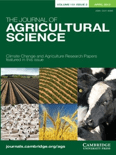
JOURNAL OF AGRICULTURAL SCIENCE
Cultivating Knowledge for a Sustainable FutureJOURNAL OF AGRICULTURAL SCIENCE, published by Cambridge University Press, stands as a pivotal resource in the field of agricultural research. With a rich history dating back to 1905, this esteemed journal has consistently delivered cutting-edge scholarly articles that address pressing issues in agronomy, crop science, animal science, and genetics. Currently holding a Q2 ranking in Agronomy and Crop Science and Animal Science and Zoology, and a Q3 in Genetics, it reflects a robust impact within the academic community, contributing to innovative practices and technologies in agriculture. Indexed in Scopus, its authors benefit from broad visibility, supported by a strong readership among researchers, professionals, and students alike. While the journal does not currently offer open access, its rigorous peer-review process ensures that published works meet the highest scholarly standards, fostering a rich environment for knowledge exchange and advancement in agricultural science.

Fourrages
Elevating forage science to enhance agricultural systems.Fourrages is a specialized journal dedicated to advancing the field of forage science, published by the Association Française de Production Fourragère. Based in France, this journal focuses on the research and development of forages and their role in agricultural systems, improving livestock production, and contributing to food security. Despite its recent inclusion in the lower quartiles of key agricultural categories—ranking Q4 in Agronomy and Crop Science and Q4 in Food Science—the journal serves as a critical platform for disseminating valuable findings that might inform both academic and practical approaches to forage management. The journal is not currently open access, which suggests a curated selection of contributions aimed at a more focused audience, ideal for researchers and professionals looking to deepen their expertise in agronomy and crop science. With a comprehensive history stretching from 2008 to 2019 and a renewed focus in 2021, Fourrages remains an essential resource for anyone involved in the study or application of forage production and its significance in sustainable agriculture.
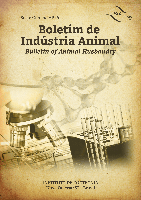
BOLETIM DE INDUSTRIA ANIMAL
Advancing Knowledge in Animal Industry PracticesBOLETIM DE INDUSTRIA ANIMAL is a prominent academic journal dedicated to the field of animal industry, published by the Instituto de Zootecnia. As an Open Access journal since 1974, it provides a vital platform for researchers, professionals, and students to disseminate knowledge and advancements in animal production, husbandry, and veterinary sciences. With its commitment to enhancing the visibility and accessibility of research, BOLETIM DE INDUSTRIA ANIMAL encourages rigorous scientific inquiry and innovation within its community. The journal presents a rich repository of articles encompassing a wide range of topics related to animal science and industry practices. Published in Brazil and accessible globally, it aims to foster collaboration and knowledge exchange among scholars, ultimately contributing to the advancement of sustainable practices in the agricultural and animal husbandry sectors.